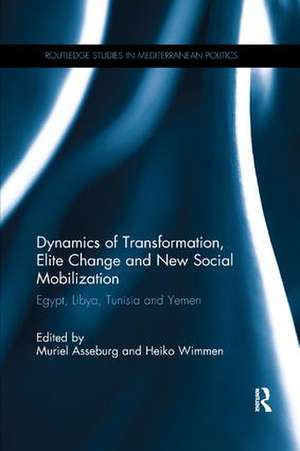Dynamics of Transformation, Elite Change and New Social Mobilization: Egypt, Libya, Tunisia and Yemen: Routledge Studies in Mediterranean Politics
Editat de Muriel Asseburg, Heiko Wimmenen Limba Engleză Paperback – 17 ian 2019
| Toate formatele și edițiile | Preț | Express |
|---|---|---|
| Paperback (1) | 414.32 lei 6-8 săpt. | |
| Taylor & Francis – 17 ian 2019 | 414.32 lei 6-8 săpt. | |
| Hardback (1) | 999.46 lei 6-8 săpt. | |
| Taylor & Francis – 8 mai 2017 | 999.46 lei 6-8 săpt. |
Preț: 414.32 lei
Nou
Puncte Express: 621
Preț estimativ în valută:
79.29€ • 82.88$ • 67.00£
79.29€ • 82.88$ • 67.00£
Carte tipărită la comandă
Livrare economică 06-20 martie
Preluare comenzi: 021 569.72.76
Specificații
ISBN-13: 9780367142964
ISBN-10: 0367142961
Pagini: 224
Dimensiuni: 156 x 234 x 12 mm
Greutate: 0.41 kg
Ediția:1
Editura: Taylor & Francis
Colecția Routledge
Seria Routledge Studies in Mediterranean Politics
Locul publicării:Oxford, United Kingdom
ISBN-10: 0367142961
Pagini: 224
Dimensiuni: 156 x 234 x 12 mm
Greutate: 0.41 kg
Ediția:1
Editura: Taylor & Francis
Colecția Routledge
Seria Routledge Studies in Mediterranean Politics
Locul publicării:Oxford, United Kingdom
Public țintă
Postgraduate and UndergraduateCuprins
1. Introduction: Dynamics of Transformation, Elite Change and New Social Mobilization in the Arab World 2. Managing Change: How Egypt's Military Leadership Shaped the Transformation 3. Youth Movements in the Egyptian Transformation: Strategies and Repertoires of Political Participation 4.Libya’s Local Elites and the Politics of Alliance Building 5. Mobilized Publics in Post-Qadhafi Libya: The Emergence of New Modes of Popular Protest in Tripoli and Ubari 6. Islamists, Secularists and Old Regime Elites in Tunisia: Bargained Competition 7. Contested Transformation: Mobilized Publics in Tunisia between Compliance and Protest 8. Political Bargaining and Violent Conflict: Shifting Elite Alliances as the Decisive Factor in Yemen’s Transformation 9. Yemen’s Enduring Resistance: Youth Between Politics and Informal Mobilization 10. Conclusion: Explaining the Arab Uprisings: Transformations in comparative perspective
Descriere
This book analyzes the contestations for power in those Arab countries that witnessed a change in the (formal) prime decision maker as a result of the so-called Arab Spring and where a formal transformation process was enacted. It identifies competing centres of power, analyses the dynamics between them, and asks how and to what degree the citizens who initiated the protest movements have achieved a say in the shaping of the futures of their countries.













